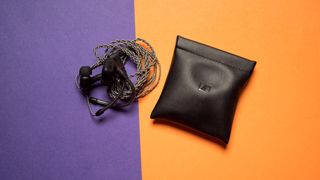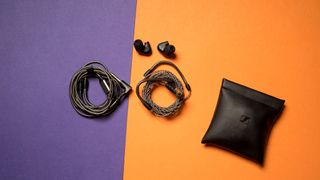Android Central Verdict
With the IE200, Sennheiser is making its terrific 7mm driver available to a wider audience. The IEMs retain the same neutral tuning as the rest of the models in the series, and while Sennheiser went with a plastic design, the build quality is among the best. The lightweight design and small size makes the IE200 one of the most comfortable IEMs around, and you get excellent isolation. But the best part is that the IE200 sounds nearly as good as its costlier siblings, and if you want value-focused IEMs from Sennheiser, this is the obvious choice.
Pros
- +
Sturdy design
- +
Comfortable fit
- +
Neutral sound with great dynamics
- +
Good isolation
- +
Standout value
Cons
- -
No balanced cable
- -
Bass isn't as vibrant as IE300
Why you can trust Android Central
Sennheiser is known for its HD series of headphones, but the brand has branched out into the true wireless segment in recent years, and the likes of the Momentum 4 and Momentum 4 True Wireless deliver standout audio on the go. Thankfully, Sennheiser continues to make enthusiast-focused products, and the IE200 may just be one of its best IEMs yet.
The IE200 is the latest introduction in the brand's IEM portfolio, joining the likes of the IE900 and the terrific IE600. It takes the place of the IE300, with Sennheiser aiming to offer the same sound quality at a more accessible price point. Whereas the IE300 started out at $299, the IE200 retails for just $149 — half the cost.
There are a few differences between the two; you don't get the same cable or a hard shell storage box, but the design is identical, and most importantly, the IE200 has the same 7mm driver that's featured in not just the IE300, but also the IE600. That in itself makes the IE200 noteworthy, and what's also great is that the IEMs deliver a neutral sound, unlike the bass-heavy tuning of the rest of the models.
Ultimately, the IE200 isn't just a great starting point, but one of the best-sounding IEMs you'll find in this segment.
Sennheiser IE200: Pricing and availability

Sennheiser unveiled the IE200 in January 2023, and the IEMs are available globally. They debuted at $149, but Sennheiser is now selling the IE200 for just $119 on Amazon and its own website, making it an even better value. They cost £119 ($150) in the U.K. as well, and in India, they're now selling at ₹8,990 ($108), a terrific bargain.
Sennheiser IE200: Design and comfort

Sennheiser retained the same design with the IE200, but given the IEMs budget stature, it doesn't get a metal chassis. The IE200 instead get a plastic shell, and at 4g, it is one of the lightest IEMs I've ever used. It misses out on the flair that you get with the polished metal housings of the IE300, IE600, and the IE900, but at the end of the day, you're buying these for the sound quality, and that's where it truly comes into its own.

The build quality is outstanding, and the best part is that the IE200 has the same diminutive size, giving it a great fit. The smaller size and lightweight design makes the IE200 one of the most comfortable IEMs around. There's absolutely no fatigue even with extended use, and even if you have smaller ears, you're guaranteed to get a good fit.

Sennheiser bundles a good selection of silicone and memory foam tips with the package, but you don't get a hard shell carrying case, with the brand instead offering a carrying pouch. The bundled tips are decent, but you should invest in SpinFit if you want a tighter seal. The way the sound tube is designed to nestle into the ear canal ensures you get great isolation by default, and that isn't an issue.

In fact, the only thing I don't like about the IE200 is the default cable; the branded cable is passable, but it isn't anywhere as good as the cable that you get with the IE600 or even the IE300. It ends in a 3.5mm plug, there's no memory retention, and it doesn't have a plastic sheath. Like the other models in the series, Sennheiser uses the MMCX standard to connect the cable to the IE200.

It's understandable why Sennheiser didn't bundle its usual cable with the IE200 — it costs $149 on its own. Anyway, as I already have the IE600, I used the 3.5mm cable that comes with that with the IE200. Outside of the issues with the cable, the IE200 gets everything right on the design side of things.
Sennheiser IE200: Sound quality

With an impedance of 18Ω and sensitivity of 119dB, the IE200 is effortlessly easy to drive. If you have a device with a 3.5mm jack, you can easily power the IEMs without any hassle, and any dongle DACs — like the Fiio KA11 or KA13 — will let you maximize the potential of the sound. I paired the IE200 with the Fiio M23 most of the time, and used it with the MIAD01.

Having used the IE600 extensively over the course of the last two years, I was interested in seeing how the IE200 would hold up. It uses the same 7mm driver and retains Sennheiser's characteristic neutral tuning, but it misses out on the low-end exuberance that allowed the IE600 to shine. You still get detailed bass, but it isn't as energetic, and you don't get that rumble.
The mid-range is where the IE200 excels, with the IEMs delivering a clean sound with a lot of vigor. Instrument notes come through with plenty of clarity and definition, and vocals in particular shine. The treble is similarly detailed, and while it tends to be a bit bright at times, there is no harshness to the sound, and it is close to the IE600 in this regard.
It is incredibly easy to drive as well; you don't need a good source to get the most out of the IEMs, but with the best dongle DACs, the IE200 sounds great.
Sennheiser IE200: The competition

There are dozens of great choices if you want IEMs in the $100 segment. Truthear's Hexa continues to be a good recommendation, and I like the sound of TinHiFi's P1 Max. Etymotic's ER2XR is a solid option too, with the IEMs offering good bass and mid-range, along with a comfortable fit.
Sennheiser IE200: Should you buy it?

You should buy this if:
- You want comfortable IEMs
- You need a neutral sound
- You want a great value
You shouldn't buy this if:
- You need a bass-focused sound
Overall, Sennheiser managed to do a great job with the IE200. The small design combined with the ultra-light chassis means you get a great fit all the time, and they're extremely comfortable — most of the time, I didn't even realize I was wearing the IEMs.
Obviously, you're buying the IE200 for the sound quality, and there is a lot to like in this area. While it isn't deliver as engaging a low-end as the rest of the models in the series, you still get a clean bass, and the mid-range and treble are detailed. If you like IEMs with a neutral sound and want the best value, you can't go wrong with the IEMs.

Harish Jonnalagadda is a Senior Editor overseeing Asia at Android Central. He leads the site's coverage of Chinese phone brands, contributing to reviews, features, and buying guides. He also writes about storage servers, audio products, and the semiconductor industry. Contact him on Twitter at @chunkynerd.

